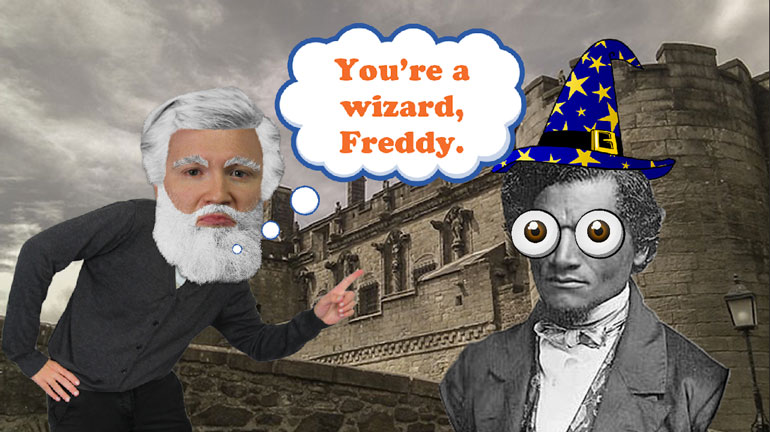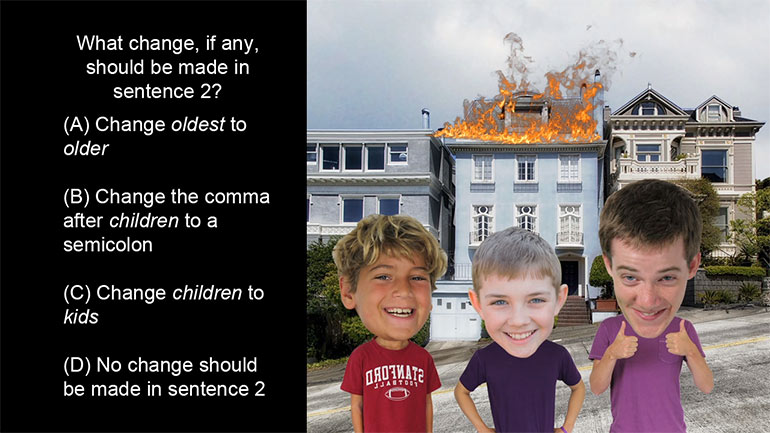ShmoopTube
Where Monty Python meets your 10th grade teacher.
Search Thousands of Shmoop Videos
Texas EOC English 2 Editing 2.4 32 Views
Share It!
Description:
Want to pull an Oliver Twist and ask us for more? We've gotcha covered. Head over to /video/subjects/english/test-prep/texas-eoc/revision/ for more EOC goodness. No porridge included.
Transcript
- 00:04
Here’s your Shmoop du jour, brought to you by the fight to stop animal cruelty.
- 00:09
Because the mean-girl squirrels who make fun of our outfits must be stopped. [Squirrels laugh]
- 00:14
Check out the following passage...
- 00:24
What change, if any, should be made in sentence 6? [Asks question]
- 00:27
And here are the potential answers...
Full Transcript
- 00:31
This sentence says that humans have forgotten that they’re animals. [Eating]
- 00:35
Which is probably true for most people, except those who make their livings waxing backs.
- 00:41
The first option to go is (A).
- 00:45
Changing we to us would be incorrect since us is an object pronoun.
- 00:50
We need the subject pronoun we here since it’s the subject of the sentence’s final clause.
- 00:56
Huh...Are we the only ones who think Final Clause sounds like the title of a movie in
- 01:00
which Santa is trapped on a distant planet and has to fight for his life in an alien
- 01:04
gladiatorial arena? [Santa fights aliens]
- 01:06
Yeah, we probably are the only ones.
- 01:08
On to option (B), which doesn’t do anything worth doing.
- 01:11
Too and as well mean basically the same thing, so swapping one for the other wouldn’t make
- 01:16
anything better.
- 01:17
If our iPhone was fried because we dropped it in the toilet, [iPhone in toilet]
- 01:21
it wouldn’t help to replace its unbroken screen with another unbroken screen, now would it?
- 01:24
The answer is no.
- 01:26
Option (C) isn’t going to work either.
- 01:27
Nixing the helping verb "have" leaves us with the simple past tense verb forgot.
- 01:34
But that doesn’t work with the meaning of the sentence. [Red X appears]
- 01:37
Choice (D) totally gets it.
- 01:39
This question deals with past participles.
- 01:42
Past parti...wah? [Confused look]
- 01:43
Here's the deal: when we use the verb to have before another verb, we need the participle
- 01:48
of the second verb, which is sometimes different than the past tense.
- 01:52
Examples...
- 01:53
I have been to the mall.
- 01:55
He has left for the mall.
- 01:57
She had taken us to the mall, but now nobody can find it, and the GPS won’t work, and
- 02:02
we’re totally lost, and... [Lost children]
- 02:03
OK, we got carried away with that last one.
- 02:05
Anyway, (D) shows the correct change in sentence 6 because it replaces the past tense forgot
- 02:09
with the participle forgotten. [Butterfly net catches forgot]
- 02:11
Don’t feel bad for forgot.
- 02:13
We’ll set it free on the happy farm where all unwanted verbs go.
Up Next
Want to pull an Oliver Twist and ask us for more? We've gotcha covered. Click on this link for more Texas EOC goodness. Porridge not included.




